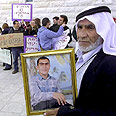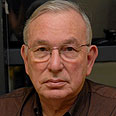_a.jpg)
Arab rioters, October 2000
Photo: Elad Gershgoren

Families of victims protest
Photo: Zoom 77
The attacks on the Police Investigation Unit for closing investigations against police behavior during the October, 2000 riots stem from the wide gap between police findings and those of the Or Commission.
Attorney General Menachem Mazuz agreed to the demand, but took pains to explain that the decision had nothing to do with public pressure. Okay.
Police explanations for this gap – a lack of evidence that would stand the test of a court trial – were rejected by many public figures in Israel, including leaders of the Israeli Arab community. They demanded yet another investigation into the events, this time by an external body with no link to the police.
October Riots
B. Michael
There is a direct connection between "targeted assassinations" and the police decision to close investigations against the police
But what would happen if this investigation also fails to find sufficient proof to charge police in the affair? Will the Israeli Arab community or its leaders accept these findings?
Clearly not. Their suspicions of police wrongdoing will not be reduced in the slightest, even if Israel were to answer demands by families of the victims to include international representatives on such an investigative body (an impossible proposal, and one Israel must reject out-of-hand for many reasons.)
The only acceptable conclusion for the Arab community would be a pre-ordained decision to hang several cops over the affair.
Knesset Member Ahmad Tibi (Hadash-Ta'al) revealed much about the reigning feeling amongst this community by saying, "There's a victim, so there must be a killer."
Circular argument
This is a circular argument that allows no room to question the guilt of the accused, and sets a pre-determined requirement to find guilty parties and to convict them.
The suspicions and bitterness of Israeli Arabs will only be healed by a complete reversal in the state's relations to its minorities. The Or Commission addressed the state's relations with its Arab citizens in the introduction to its report, and recommended steps to reduce feelings of injustice.
The Lapid Commission, established following the Or Commission report, dealt with these recommendations. But the government threw the whole bit in the garbage.
But the Or Commission's harsh words for the state do not erase the fact that the Commission also had several choice comments about the Arab community and its leaders.
The report offers a history of Arab demonstrations and protests that over time have become evermore extreme. The report also mentions several individuals that contributed, through words and through silence, to the progression from legitimate protest into a violent, destructive riot.
Leaders of the Islamic Movement, wrote the Or Commission, fanned the flames by accusing Israel of planning to destroy the Islamic holy sites on the Temple Mount, and openly sympathizing with Hizbullah and al-Qaeda.
MK Azmi Bishara (National Democratic Assembly) has said the Shiite militia should be a role model for the struggle with Israel, and has called several times for an intifada against Israel.
Arab-Israeli leaders should be investigated
The Or Commission- including one Arab justice and another member considered an important expert in Arab culture - rejected Bishara's evasive comments, and had this to say about the part Israeli Arab leaders played in the October, 2000 riots:
"In addition to the existence of literal responsibility, meaning the causing or pushing towards the events, we have already seen in the past the existence of normative responsibility in the public realm that is not based on criminal norms, but rather on norms which have at their center the ability to foresee painful consequences and about failure to take appropriate steps to advance these possibilities."
It is clear, then, even though it is written in legalistic jargon.
Individuals such as the leaders of the Supreme Israeli Arab Monitoring Committee, the Islamic Movement, and Knesset Members Tibi, Bishara, Dehamshe and Zahalka were full partners to the outbreak of riots in October, 2000, and therefore also bear responsibility for the deaths of 13 of their brethren.
If we are to reopen this investigation – as indeed we should – then we must investigate these individuals as well.
















